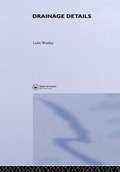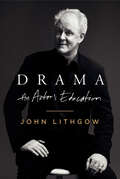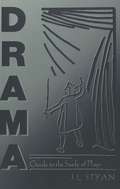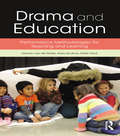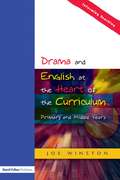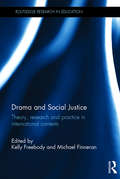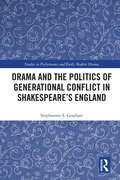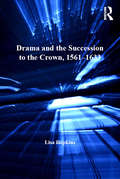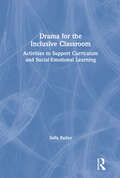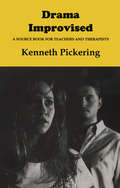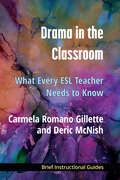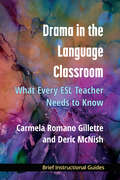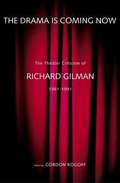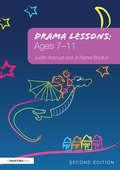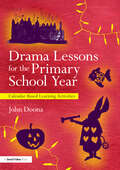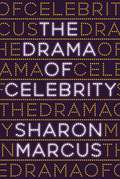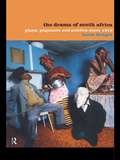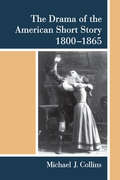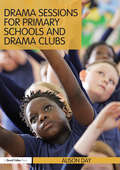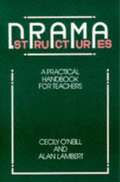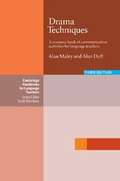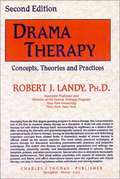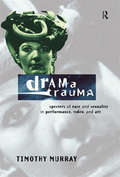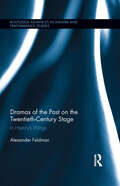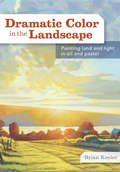- Table View
- List View
Drainage Details
by L. WoolleyA unique set of 45 information sheets giving complete details of all forms of drainage work for the builder and surveyor.
Drama: An Actor's Education
by John Lithgow"A memoir as finely crafted as one of Lithgow’s performances."—Steve Martin Emmy Award-winner John Lithgow presents a charming, witty, and revealing memoir about his family, his work, and his life in Drama—an intimate story of insights and inspirational reflections from one of America’s most beloved actors. Lithgow pays tribute to his father, his greatest influence, and relives his collaborations with renowned performers and directors including Mike Nichols, Bob Fosse, Liv Ullmann, Meryl Streep, and Brian De Palma. A compelling reflection on the trials, triumphs, and changes across his long career, Lithgow’s Drama illuminates the inner life of a celebrated talent, and points the way forward for anyone aspiring to greatness in their own life.
Drama: A Guide to the Study of Plays
by J. L. StyanThis book introduces the elements of drama and the principles behind the reading and study of plays--classical and modern. It makes a special point of seeing drama as intended for acting and performance, and it therefore emphasizes the role of the spectator at a play and the sort of theatre for which drama was written. The performance approach to the study of plays finally clarifies the different kinds of drama (comedy, tragedy, melodrama, and farce) and identifies its forms (realism, stylization, and symbolism). The book draws on specific examples of drama, is rich in helpful charts and diagrams, and contains a comprehensive glossary. This book will be a useful guide for students and general playgoers alike.
Drama and Education: Performance Methodologies for Teaching and Learning
by Manon van de Water Mary McAvoy Kristin HuntDrama and Education provides a practical, comprehensive guide to drama as a tool for teaching and learning. It is among the first practical drama and performance textbooks that address brain-based, neuroscientific research, making the argument that creativity is necessary in our lives, that embodied learning is natural and essential, and that contextual learning helps us find our place in society in relationship to other peoples and cultures. As well as a historical and theoretical overview of the field, it provides rationale and techniques for several specific methodologies:?linear drama, process-oriented drama, drama for social justice, and performance art. Each approach is supplemented with sample lesson plans, activities, ideas for differentiation, and extensive bibliographies. The topics are discussed from five key angles: ? • Historical and theoretical foundations • Curricular applications • Practical toolkits for a range of classrooms and learning environments • Different strategies for lesson plans • Extension options for longer workshops. ? Alongside these core methods, the integration of other innovative forms—from performance art to Theatre of the Oppressed—into drama-based learning is explored, as well as the pragmatic concerns such as assessment, planning, and advocacy for arts learning and arts education partnerships. ? Drama and Education is the comprehensive textbook for teachers and students on Applied Theatre and Theatre and Education courses. ?
Drama and English at the Heart of the Curriculum: Primary and Middle Years
by Joe WinstonFirst Published in 2005. Routledge is an imprint of Taylor & Francis, an informa company.
Drama and Social Justice: Theory, research and practice in international contexts (Routledge Research in Education)
by Kelly Freebody Michael Finneran"This text offers a cohesive framework for exploring social justice through drama and drama from a social justice perspective. Research based examples of practice from a range of international contexts link theory and practice. Connecting chapters raise key critical questions in an engaging dialogue format. An important addition to the literature on social justice education." - Lee Anne Bell, author Storytelling for Social Justice (2010) and co-editor of Teaching for Diversity and Social Justice (Routledge, 2007) Much has been written within the tradition of drama education and applied theatre around the premise that drama can be a force for change within both individual lives and society more broadly. However, little has been published in terms of charting the nature of this relationship. By combining theoretical, historical and practical perspectives, this book unpacks and explores drama’s intrinsically entwined relationship with society more comprehensively and critically.Chapters gather together and develop a range of theoretical understandings of social justice in applied drama in the first part of the book, which are then used to frame and inform more focused discussions of drama research and practice in the second. Contributors move beyond practical understandings of drama for empowerment or development in order to engage with the philosophy of praxis – the interconnected and symbiotic nature of theory derived from practice, and practice derived from theory. Including concrete examples from current research and practice in the field, the book opens up a conversation on and counter-narrative to perceptions of the nature and impact of applied theatre and drama education on social justice.Drama and Social Justice will be key reading for postgraduate students, academics, researchers and field-based practitioners in the areas of applied drama and theatre, education and youth work, and social justice and the social sciences.
Drama and the Politics of Generational Conflict in Shakespeare's England (Studies in Performance and Early Modern Drama)
by Stephannie GearhartDrama and the Politics of Generational Conflict in Shakespeare’s England examines the intersection between art and culture and explains how ideas about age circulated in early modern England. Stephannie Gearhart illustrates how a variety of texts – including drama by Shakespeare, Jonson, and Middleton – placed elders’ and youths’ voices in dialogue with one another to construct the period’s ideology of age and shape elder-youth relations.
Drama and the Succession to the Crown, 1561-1633 (Studies In Performance And Early Modern Drama Ser.)
by Lisa HopkinsThe succession to the throne, Lisa Hopkins argues here, was a burning topic not only in the final years of Elizabeth but well into the 1630s, with continuing questions about how James's two kingdoms might be ruled after his death. Because the issue, with its attendant constitutional questions, was so politically sensitive, Hopkins contends that drama, with its riddled identities, oblique relationship to reality, and inherent blurring of the extent to which the situation it dramatizes is indicative or particular, offered a crucial forum for the discussion. Hopkins analyzes some of the ways in which the dramatic works of the time - by Marlowe, Shakespeare, Webster and Ford among others - reflect, negotiate and dream the issue of the succession to the throne.
Drama for the Inclusive Classroom: Activities to Support Curriculum and Social-Emotional Learning
by Sally BaileyIncorporate drama and improvisation into your classroom to build confidence, support social-emotional learning, and engage every student in the curriculum. This book’s detailed and easy-to-implement chapters walk you through using drama to develop critical listening and communication skills, conflict resolution abilities, behavior regulation, and even grow new skills in math, literature, geography, and more! Each chapter builds on the skills learned in previous lessons, allowing you to increase the complexity as students progress. Designed for use with inclusive classrooms as well as dedicated special education programs, this guide features adaptable activities to include students at every ability level.
Drama Improvised: A Sourcebook for Teachers and Therapists
by Kenneth PickeringThis book provides a practical, accessible, and inexpensive guide to using improvisation in drama, which lies at the root of actor training, educational drama and drama therapy, in a wide variety of situations. It is useful for teachers, organizers of drama workshops, therapists and trainers.
Drama in the Language Classroom: What Every ESL Teacher Needs to Know
by Carmela Romano Gillette Deric McNish"Our particular approach is built on the belief that using elements of drama and the performing arts in the language classroom works best when it builds on concepts of language development that have been tested and supported. As language scholars, we know that honoring students’ identities is important; that investment in the learning process must be nurtured; that learners respond to material that is engaging, relevant, and authentic; that learners must use the language and not just study it; and that affective factors can sometimes impede learning." ---Carmela Romano Gillette & Deric McNish This e-book weaves together cutting-edge research and practices from the fields of theater and TESOL. After providing an overview of how drama can be used in the language classroom, Gillette (a TESOL expert) and McNish (an expert in actor training) present a collection of resources teachers need to begin using drama, including practical classroom-tested and evidence-based techniques. They show how: * theater games can build confidence. * performing (beyond role-plays) can develop a deeper context for speaking. * improvisation can create authentic opportunities for language use. * para- and extra-linguistic techniques can improve expression and meaningful communication. * activities like script analysis can be used in reading and writing classes (and to examine differences between spoken and written language). * drama-based activities can provide a platform for examining cultural norms and practices. Each section includes sample activities for improving fluency and assessment suggestions. ?No experience with performance or drama required to learn how to incorporate these practices into your ESL classroom!
Drama in the Language Classroom: What Every ESL Teacher Needs to Know
by Carmela Romano Gillette Deric McNishDrama in the Language Classroom weaves together cutting-edge research and practices from the fields of theater and TESOL. After providing an overview of how drama can be used in the language classroom, Carmela Romano Gillette (a TESOL expert) and Deric McNish (an expert in actor training) present a collection of resources teachers need to begin using drama, including practical classroom-tested and evidence-based techniques. They show how theater, performance, and improvisation can help students build confidence, develop a deeper context for speaking, and create authentic opportunities for language use. In addition, they outline the para- and extra-linguistic techniques that can improve expression and meaningful communication. Each section includes sample activities, such as script analysis for improving fluency, and assessment suggestions. Readers do not need to have experience with performance or drama to learn how to incorporate these practices into the ESL classroom.
The Drama Is Coming Now: The Theater Criticism of Richard Gilman, 1961-1991
by Richard Gilman Gordon RogoffThis engrossing book presents the first collection in more than three decades of one of America's finest drama critics. Richard Gilman chronicles a major period in American theater history, one that witnessed the birth or spread of Off-Broadway, regional theater, nonprofit companies, and avant-garde performance, as well as growing interest in plays by women and minorities and in world drama. His writing, however, is more than a revealing look at an era. It is criticism for the ages. Insightful, provocative, and impassioned, the articles represent the full range of Gilman's interests. There are essays, profiles, and book reviews dealing with such topics as the "new naturalism" in theater, Brecht's collected plays, and the legacy of Stanislavski. There is also a generous sampling of Gilman's comments on plays by O'Neill, Miller, Chekhov, Albee, Ibsen, Anouilh, Beckett, Ionesco, Pinter, Fugard, and many others.
Drama Lessons: Ages 7-11
by Judith Ackroyd Jo Barter-BoultonDrama Lessons: Ages 7–11 offers an exciting and varied range of tried and tested lessons tailor-made for busy teachers. Drama Lessons: Ages 7–11 emerges from the continuing positive responses to Drama Lessons for Five to Eleven Year Olds (2001). In this book you will find a carefully chosen selection of the best lessons from the original book, plus some exciting new material – a combination of brand new and classic lessons. This new collection introduces Literacy Alerts which identify how the drama activities develop aspects of literacy and suggest additional literacy activities. For each lesson plan, essential resources and timing information are provided. The lessons cover a range of themes and curriculum areas. Full of pick-up-and-go lesson plans, this book will be of enormous interest to specialists and non-specialists of drama alike. All primary teachers, literacy coordinators and teaching assistants should have this book in their hands and it will give all trainee teachers a flying start in their school placements.
Drama Lessons for the Primary School Year: Calendar Based Learning Activities
by John DoonaA year of drama – ready to use schemes at your fingertips. 25 topical schemes of work 100+ drama lessons 'This book really will offer some new and exciting ideas for teachers to teach. Even teachers who enjoy their job often complain that they become stale after teaching the same things every year. They look for new ideas that will reignite their enthusiasm. I think this book could offer some sparks' Jo Howells, English Advisor, Warwickshire Educational Development Service Looking to engage, enthral and educate your pupils in timely and topical drama- based activities? In need of dynamic and inventive cross-curricular exercises for single lessons, extended units or school assemblies? From the September blues of change, through Great Fires, Guy Fawkes, Antarctic penguins, Rainbow Fish and Chinese Walls to Mandela’s mighty day, this book offers a fascinating array of lives to be lived and journey’s to be made. Drama Lessons for the Primary School Year will enable teachers to develop their expertise and confidence in order to create active and imaginative schemes of drama for the classroom. It offers a programme of ready-to-run workshops linked to specific dates in the calendar and specific themes into which teachers can readily dip on a regular basis. The first section uncovers the author’s own creative processes in generating drama experience and offers it to the reader in a set of simple, practical steps. The rest of the book is a wide-ranging compendium of schemes of work attached to specific calendar dates throughout the school year. These detailed drama lesson plans can be run as ‘one-off’ workshops or can be used by teachers as a basis for creating their own drama-led curriculum experiences. The book offers a practical structure to support these new creative planning tasks. This indispensable resource is for all Primary teachers looking for inspiration in developing effective drama sessions, exploring kinaesthetic learning, and developing creative cross-curricular approaches to their teaching.
The Drama of Celebrity
by Sharon MarcusA bold new account of how celebrity worksWhy do so many people care so much about celebrities? Who decides who gets to be a star? What are the privileges and pleasures of fandom? Do celebrities ever deserve the outsized attention they receive?In this fascinating and deeply researched book, Sharon Marcus challenges everything you thought you knew about our obsession with fame. Icons are not merely famous for being famous; the media alone cannot make or break stars; fans are not simply passive dupes. Instead, journalists, the public, and celebrities themselves all compete, passionately and expertly, to shape the stories we tell about celebrities and fans. The result: a high-stakes drama as endless as it is unpredictable.Drawing on scrapbooks, personal diaries, and vintage fan mail, Marcus traces celebrity culture back to its nineteenth-century roots, when people the world over found themselves captivated by celebrity chefs, bad-boy poets, and actors such as the “divine” Sarah Bernhardt (1844–1923), as famous in her day as the Beatles in theirs. Known in her youth for sleeping in a coffin, hailed in maturity as a woman of genius, Bernhardt became a global superstar thanks to savvy engagement with her era’s most innovative media and technologies: the popular press, commercial photography, and speedy new forms of travel.Whether you love celebrity culture or hate it, The Drama of Celebrity will change how you think about one of the most important phenomena of modern times.
The Drama of South Africa: Plays, Pageants and Publics Since 1910
by Loren KrugerThe Drama of South Africa comprehensively chronicles the development of dramatic writing and performance from 1910, when the country came into official existence, to the advent of post-apartheid. Eminent theatre historian Loren Kruger discusses well-known figures, as well as lesser-known performers and directors who have enriched the theatre of South Africa. She also highlights the contribution of women and other minorities, concluding with a discussion of the post-apartheid character of South Africa at the end of the twentieth century.
The Drama of the American Short Story, 1800-1865
by Michael J. CollinsThe Drama of the American Short Story, 1800-1865 argues that to truly understand the short story form, one must look at how it was shaped by the lively, chaotic, and deeply politicized world of 19th-century transatlantic theater and performance culture. By resurrecting long-neglected theatrical influences on representative works of short fiction, Michael J. Collins demonstrates that it was the unruly culture of the stage that first energized this most significant of American art forms. Whether it was Washington Irving's first job as theater critic, Melville's politically controversial love of British drama, Alcott's thwarted dreams of stage stardom, Poe and Lippard's dramatizations of peculiarly bloodthirsty fraternity hazings, or Hawthorne's fascination with automata, theater was a key imaginative site for the major pioneers of the American short story. The book shows how perspectives from theater studies, anthropology, and performance studies can enrich readings of the short-story form. Moving beyond arbitrary distinctions between performance and text, it suggests that this literature had a social life and was engaged with questions of circumatlantic and transnational culture. It suggests that the short story itself was never conceived as a nationalist literary form, but worked by mobilizing cosmopolitan connections and meanings. In so doing, the book resurrects a neglected history of American Federalism and its connections to British literary forms.
Drama Sessions for Primary Schools and Drama Clubs
by Alison DayDrama Sessions for Primary Schools and Drama Clubs is an indispensable guide designed to help you run effective and enjoyable drama sessions in your primary school for a whole academic year. The author outlines thirty-three practical and user-friendly sessions, each one built around developing the social skills needed by children to become effective and positive communicators. Each session has guided time allocations and thorough explanations of what each exercise should achieve. The final session of the term culminates in a ‘show and tell’ performance in which children can show their family and friends what they have learnt. As well as the sessions, this book also includes: Links to the national curriculum and SEAL; Notes on ‘performance’; Health and safety; Extra sessions for use in smaller spaces; Explanations of the pedagogical benefits of every exercise. This unique and practical book will be of interest to all teachers who need to incorporate drama into everyday classroom learning as well as drama teachers and practitioners looking to run successful, interesting and fun drama sessions for their primary pupils.
Drama Structures: A Practical Handbook for Teachers
by Cecily O'Neill ; Alan LambertThis is a teacher's manual, providing fifteen developing lesson structures on different themes involving the pupils in a whole range of drama and learning activities. Notes on practical teaching problems and possible developments for each sequence are given on facing pages. Two further sections of the book provide a simple theoretical framework for drama teaching, and consider some key strategies. This book is for both non-specialists and drama teachers who want to develop their work further. It will be of value to all teachers using drama approaches and strategies in the school curriculum.
Drama Techniques: A Resource Book of Communication Activities for Language Teachers
by Alan Maley Alan Duff Penny UrThe fully revised edition of this 'classic' helps teachers give their learners the tools they need to express themselves through a range of stimulating drama contexts. This completely revised edition of the classic title Drama Techniques provides: *150 ideas for interesting and productive fluency practice *a large selection of drama-based techniques which focus learners' attention on communicative tasks or activities *techniques suitable for all levels *clear instructions for the teacher *advice on how to use the techniques in the classroom
Drama Therapy: Concepts, Theories and Practices
by Robert J. LandySpecially collated to introduce and expound on drama therapy with the following headlines put into study; Part I: Drama Therapy in Context Part II: The Conceptual Basis of Drama Therapy Part III: The Techniques of Drama Therapy Part IV: The Populations and Settings for Drama Therapy Part V: Research in Drama Therapy
Drama Trauma: Specters of Race and Sexuality in Performance, Video and Art
by Timothy MurrayIn this engaging cross-disciplinary study, Timothy Murray examines the artistic struggle over traumatic fantasies of race, gender, sexuality, and power. Establishing a retrospective dialogue between past and present, stage and video, Drama Trauma links the impact of trauma on recent political projects in performance and video with the specters of difference haunting Shakespeare's plays. The book provides close readings of cultural formations as diverse as Shakespearean drama, the Statue of Liberty, contemporary plays by women, African-American performance, and feminist interventions in video, performance and installation. The texts discussed include: * installations by Mary Kelly and Dawn Dedeaux, * plays by Ntozake Shange, Rochelle Owens, Adrienne Kennedy, Marsha Norman and Amiri Baraka * performances by Robbie McCauley, Jordan, Orlan, and Carmelita Tropicana * stage, film and video productions of King Lear, Othello, Romeo and Juliet and All's Well that Ends Well.
Dramas of the Past on the Twentieth-Century Stage: In History’s Wings (Routledge Advances in Theatre & Performance Studies #27)
by Alexander FeldmanThis book defines and exemplifies a major genre of modern dramatic writing, termed historiographic metatheatre, in which self-reflexive engagements with the traditions and forms of dramatic art illuminate historical themes and aid in the representation of historical events and, in doing so, formulates a genre. Historiographic metatheatre has been, and remains, a seminal mode of political engagement and ideological critique in the contemporary dramatic canon. Locating its key texts within the traditions of historical drama, self-reflexivity in European theatre, debates in the politics and aesthetics of postmodernism, and currents in contemporary historiography, this book provides a new critical idiom for discussing the major works of the genre and others that utilize its techniques. Feldman studies landmarks in the theatre history of postwar Britain by Weiss, Stoppard, Brenton, Wertenbaker and others, focusing on European revolutionary politics, the historiography of the World Wars and the effects of British colonialism. The playwrights under consideration all use the device of the play-within-the-play to explore constructions of nationhood and of Britishness, in particular. Those plays performed within the framing works are produced in places of exile where, Feldman argues, the marginalized negotiate the terms of national identity through performance.
Dramatic Color in the Landscape
by Brian KeelerFill your paintings with spring light, winter scenes, autumn ambiance, summer sunsets, and more!Dramatic Color in the Landscape will help you to discover ways to enliven your paintings with the brilliant color of your favorite seasons while exploring simple yet effective color concepts and ideas evident in everyday and dramatic lighting situations. Learn to continually evolve and improve upon your landscape compositions, step by step, with countless helpful tips and techniques designed to help you express your interpretation of any given scene.
